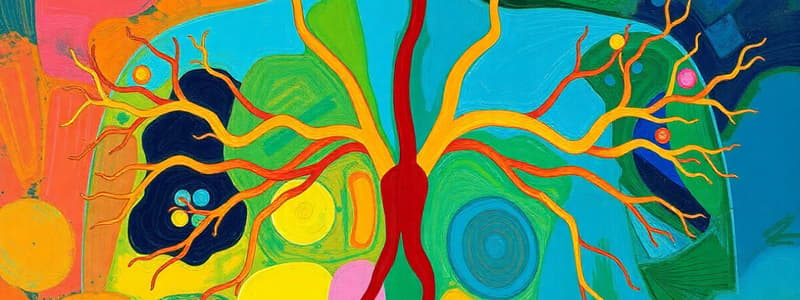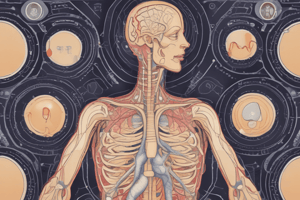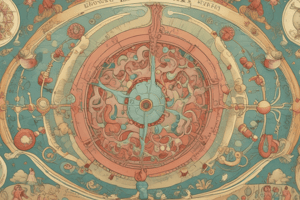Podcast
Questions and Answers
What is the primary function of Parathyroid Hormone (PTH)?
What is the primary function of Parathyroid Hormone (PTH)?
- Increases blood glucose levels
- Stimulates the production of catecholamines
- Regulates blood pressure
- Maintains calcium homeostasis (correct)
What condition is characterized by weakness in bones and potential kidney stones due to excessive hormone levels?
What condition is characterized by weakness in bones and potential kidney stones due to excessive hormone levels?
- Hypoparathyroidism
- Hyperparathyroidism (correct)
- Cushing's syndrome
- Addison's disease
Which hormone is primarily responsible for the short-term stress response?
Which hormone is primarily responsible for the short-term stress response?
- Epinephrine (correct)
- Insulin
- Cortisol
- Aldosterone
What is the primary effect of glucagon in the body?
What is the primary effect of glucagon in the body?
Which of the following conditions is associated with hyposecretion of insulin?
Which of the following conditions is associated with hyposecretion of insulin?
Which of the following is NOT a key function of the endocrine system?
Which of the following is NOT a key function of the endocrine system?
What type of hormones are synthesized from cholesterol?
What type of hormones are synthesized from cholesterol?
Which hormone is responsible for stimulating uterine contractions?
Which hormone is responsible for stimulating uterine contractions?
What condition is associated with the hypersecretion of Antidiuretic Hormone (ADH)?
What condition is associated with the hypersecretion of Antidiuretic Hormone (ADH)?
Which gland functions as both an endocrine and neuroendocrine organ?
Which gland functions as both an endocrine and neuroendocrine organ?
Which of the following is a potential effect of hormone actions on target cells?
Which of the following is a potential effect of hormone actions on target cells?
What stimulates the release of hormones in response to changes in blood levels of ions or nutrients?
What stimulates the release of hormones in response to changes in blood levels of ions or nutrients?
Which hormone is produced by the anterior pituitary and regulates gonadal hormone production?
Which hormone is produced by the anterior pituitary and regulates gonadal hormone production?
Flashcards
Endocrine System Function
Endocrine System Function
Works with the nervous system to control and regulate body functions through hormones in the blood.
Endocrine Glands
Endocrine Glands
Glands that secrete hormones directly into the surrounding tissue, lacking ducts.
Hormone Types (2)
Hormone Types (2)
Amino acid-based (water-soluble, peptides/proteins) and Steroids (lipid-soluble, from cholesterol).
Hormone Action
Hormone Action
Signup and view all the flashcards
Posterior Pituitary Hormone (Oxytocin)
Posterior Pituitary Hormone (Oxytocin)
Signup and view all the flashcards
Posterior Pituitary Hormone (ADH)
Posterior Pituitary Hormone (ADH)
Signup and view all the flashcards
Anterior Pituitary Hormone (GH)
Anterior Pituitary Hormone (GH)
Signup and view all the flashcards
Thyroid Hormone Function
Thyroid Hormone Function
Signup and view all the flashcards
Hypersecretion
Hypersecretion
Signup and view all the flashcards
Hypoparathyroidism
Hypoparathyroidism
Signup and view all the flashcards
Glucagon, Insulin
Glucagon, Insulin
Signup and view all the flashcards
Diabetes Mellitus Type 1
Diabetes Mellitus Type 1
Signup and view all the flashcards
Diabetes Mellitus Type 2
Diabetes Mellitus Type 2
Signup and view all the flashcards
Study Notes
Endocrine System Overview
- Works with the nervous system to control and regulate the body's functions
- Influences metabolic activities by transporting hormones via blood
- Key functions include reproduction, growth/development, homeostasis maintenance, metabolism/energy regulation, and defense mobilization
Endocrine Glands
- Lack ducts; release hormones directly into surrounding tissue
- Examples: pituitary, thyroid, parathyroid, adrenal, pineal glands
- Hypothalamus: a neuroendocrine organ with both neural and hormonal functions
- Other organs with endocrine tissues include pancreas, gonads, placenta, adipose cells, thymus, stomach, kidneys, and heart
Hormone Types and Actions
- Amino acid-based hormones: Peptide/protein based, water-soluble
- Steroids: Derived from cholesterol, lipid-soluble
- Eicosanoids: Classified as paracrines; influence nearby cells
- Hormones affect target cells with specific receptors
- Hormonal actions include changing plasma membrane permeability, protein/enzyme synthesis, activating/deactivating enzymes, inducing secretion, and stimulating mitosis
Hormone Regulation
- Humoral stimuli: Response to blood levels of ions/nutrients
- Neural stimuli: Nerve fibers stimulate hormone release
- Hormonal stimuli: Hormones trigger the release of other hormones
- The nervous system can override endocrine controls, like during stress
Pituitary Gland
- Posterior Pituitary (Neurohypophysis):
- Oxytocin: Uterine contractions, milk ejection
- ADH (Antidiuretic Hormone): Water retention by kidneys; increases blood volume
- ADH imbalances:
- Hyposecretion: Diabetes insipidus
- Hypersecretion: Syndrome of Inappropriate Antidiuretic Hormone (SIADH)
- Anterior Pituitary (Adenohypophysis):
- GH (Growth Hormone): Stimulates growth via IGFs
- Hypersecretion: Gigantism (children), acromegaly (adults)
- Hyposecretion: Pituitary dwarfism
- TSH (Thyroid-Stimulating Hormone): Stimulates thyroid hormone release
- ACTH (Adrenocorticotropic Hormone): Stimulates cortisol release
- FSH & LH: Regulate gonadal hormone production
- PRL (Prolactin): Stimulates milk production
- GH (Growth Hormone): Stimulates growth via IGFs
Thyroid and Parathyroid Glands
- Thyroid Hormone (TH): Increases basal metabolic rate, regulates growth/development
- Imbalances:
- Hyposecretion: Myxedema (adults), goiter (iodine deficiency)
- Hypersecretion: Graves' disease (autoimmune)
- Imbalances:
- Parathyroid Hormone (PTH): Maintains calcium homeostasis
- Imbalances:
- Hyperparathyroidism: Weak bones, kidney stones
- Hypoparathyroidism: Tetany, respiratory paralysis
- Imbalances:
Adrenal Glands
- Adrenal Cortex:
- Mineralocorticoids (e.g., Aldosterone): Regulates sodium and potassium balance
- Glucocorticoids (e.g., Cortisol): Increases blood glucose, stress response
- Hypersecretion: Cushing's syndrome
- Hyposecretion: Addison's disease
- Gonadocorticoids: Weak androgens that convert to testosterone or estrogen
- Hypersecretion: Adrenogenital syndrome (masculinization)
- Adrenal Medulla: Produces catecholamines (epinephrine & norepinephrine), short-term stress response (fight or flight)
Pineal Gland
- Secretes melatonin, regulating sleep-wake cycles
Pancreas
- Glucagon: Raises blood glucose levels
- Insulin: Lowers blood glucose levels
- Diabetes Mellitus:
- Type 1: Hyposecretion of insulin
- Type 2: Insulin resistance
Other Hormones and Organs
- Gonads: Produce sex hormones (estrogen, progesterone, testosterone)
- Placenta: Temporary endocrine organ during pregnancy
- Other organs:
- Heart: ANP (reduces blood pressure)
- Kidneys: Erythropoietin (RBC production), Renin (blood pressure regulation)
Clinical Considerations
- Hormone imbalances significantly impact metabolism, growth, and homeostasis
- Environmental pollutants can disrupt hormone function
Studying That Suits You
Use AI to generate personalized quizzes and flashcards to suit your learning preferences.




